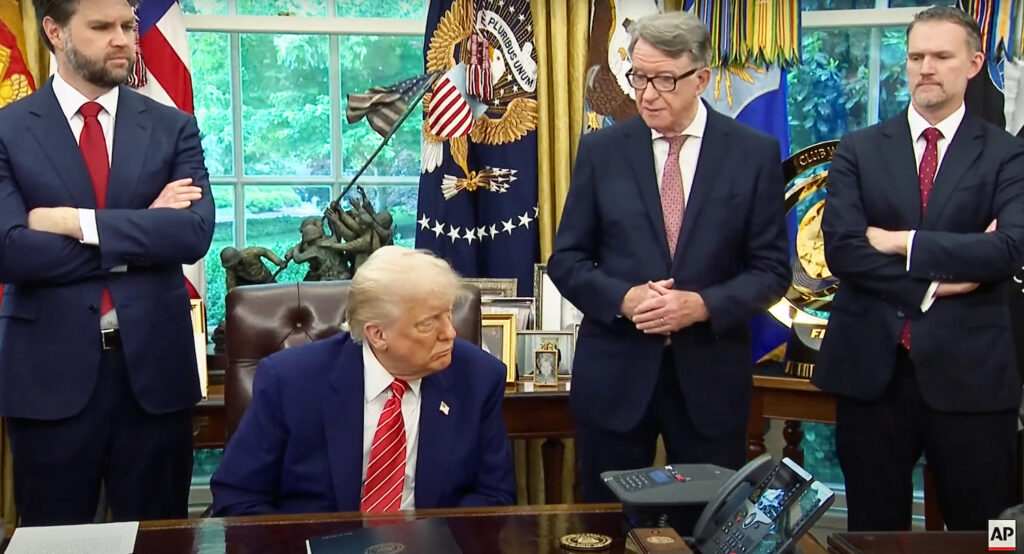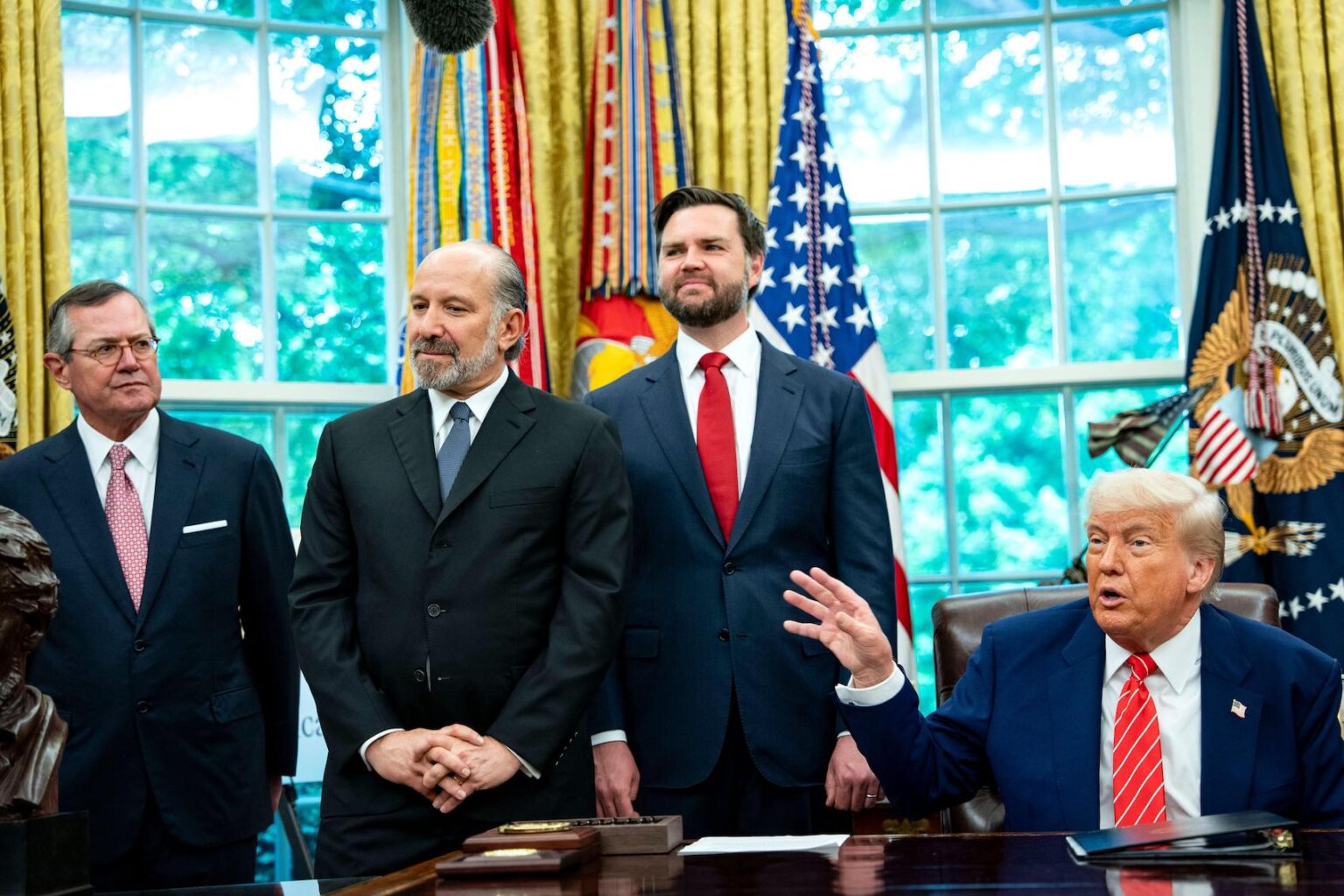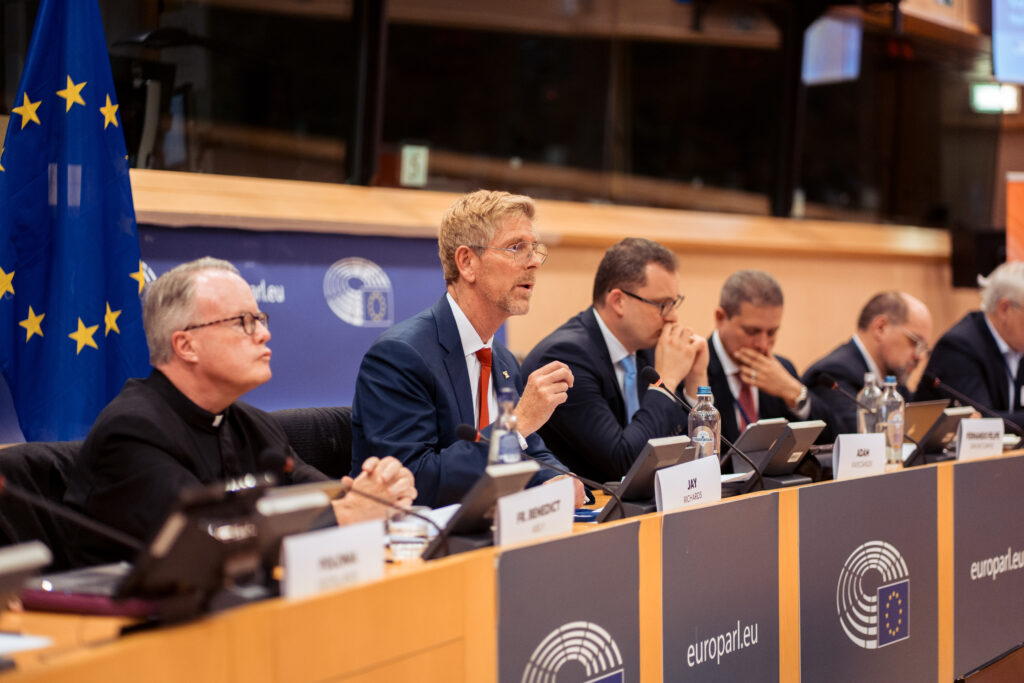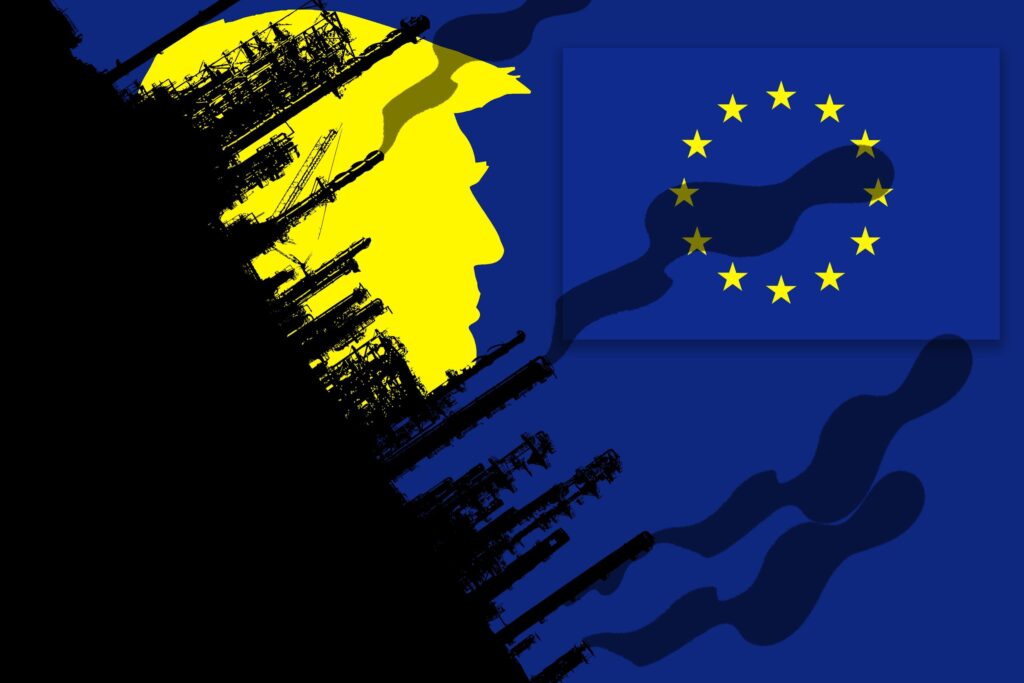President Donald Trump’s UK ambassador holds shares worth hundreds of millions in the key sectors that stand to benefit from last week’s UK-U.S. trade agreement.
Stephens played a key role in pushing through the deal, according to the UK’s ambassador to the U.S. Peter Mandelson, while campaigners have raised concerns that he will personally benefit.
According to financial records viewed by DeSmog and The Lever, Warren Stephens’ family-owned investment company Stephens Inc. owns stocks worth at least $250 million in agriculture and food firms — the principal beneficiaries of the deal announced by the United States and the UK on 8 May.

This article is being co-published with The Lever, an investigative newsroom. Click here to get The Lever’s free newsletter.
The trade agreement, which allows the U.S. agriculture sector to trade more easily in the UK, “will create a $5 billion opportunity for new exports for U.S. farmers, ranchers, and producers,” according to the Trump administration.
The deal also pledges that the two nations will negotiate a “transformative technology partnership” and a deal on pharmaceuticals.
According to Stephens Inc.’s latest filing with the Securities and Exchange Commission (SEC), on 31 March the firm had at least $800 million invested in tech companies and at least $220 million in pharmaceutical firms.
Stephens Inc. also had $8 million invested in the aviation firm Boeing, which sold 32 planes to British Airways after the trade agreement was announced. As part of the deal, the U.S. agreed to drop tariffs on Rolls-Royce engines and other plane parts from the UK.
“For anyone still questioning who’s likely to benefit most from this trade deal, look no further,” said Harmit Kambo, a campaign manager at the Good Law Project, a UK-based legal advocacy group.
Subscribe to our newsletter
Stay up to date with DeSmog news and alerts
Prior to starting the diplomatic role, Stephens stated in his ethics undertakings that he would remain a shareholder at Stephen’s Inc. but would resign from a management position and would not participate in any matter as ambassador that has a “direct predictable effect” on the financial interests of the company, unless he obtains a written waiver.
Speaking in the Oval Office during the announcement of the deal, the UK’s ambassador to the U.S., Peter Mandelson, personally credited Stephens with getting the deal over the line.
“Yesterday I received a call, a very diplomatic call, that edged things over the line, from your new ambassador in the UK, Warren Stephens,” Mandelson said. “He’s flying to London tomorrow night. He’s going to be very popular with the British people. He’s going to be a very successful ambassador.”
DeSmog previously revealed that Stephens, a billionaire, gave $4 million to Trump’s inauguration fund on the same day that he was nominated for the ambassadorial role.
There is no evidence that Stephens used his diplomatic position to orchestrate a deal that would boost his family’s investments or benefit the firms in their portfolio.
The Stephens Inc. did not respond to a request for comment. The U.S. embassy in London did not respond on the record.
Big Ag
Stephens Inc., founded in 1933, has a $7 billion portfolio listed with the SEC, making it one of the largest privately owned investment banks in the U.S..
Warren Stephens is listed as chairman of the company, having also served as its CEO and president prior to being appointed as Trump’s ambassador to the UK in February. The firm is now run by Warren’s sons, joint-CEOs Miles and John Stephens.
Based on the firm’s latest SEC filing, Stephens Inc. has investments in a number of agriculture and food companies that may benefit from the UK-U.S. trade deal.
This includes the Campbell’s Company, one of the largest processed food companies in America; the agribusiness giant Bunge Global; and Tyson Foods, the largest U.S. beef exporter.
Although the Trump administration has talked-up the opportunities provided to agriculture firms by the trade agreement, the deal only currently appears to cover beef and ethanol exports — albeit with a commitment to continue “working together to improve market access for agricultural products.”
U.S. Secretary of Agriculture Brooke Rollins, who visited the UK on a trade mission this week, said the U.S. wants its pork, poultry, rice, and seafood sectors to be granted expanded access to the UK market — claiming these industries were “at the front of the line” of the ongoing trade negotiations.
The food industry appears to have a big sway over the Trump administration. The top corporate donor to Trump’s inauguration fund was the poultry company Pilgrim’s Pride, a subsidiary of the Brazilian meat giant JBS, which gave $5 million.
The Trump administration has in recent weeks withdrawn a proposed regulation that would have limited salmonella content in raw poultry and required producers to test their products for salmonella before selling them.
Meanwhile, British farmers and food producers have already raised concerns about being undercut by cheaper U.S. imports that may not meet UK or EU hygiene standards.
Increased trade in agriculture may also have climate impacts. Livestock accounts for over 14 percent of all greenhouse gas emissions worldwide, and scientists agree that fast and drastic cuts to the sector’s pollution are required to limit global heating.
Speaking in the Oval Office during the announcement of the trade agreement, Rollins claimed that it would “exponentially increase our beef exports”.
Though the agreement was heralded by both countries, the U.S. has maintained a blanket 10 percent tariff on most UK goods following Trump’s claim that “the world has taken advantage of the U.S. for many years.”
Big Tech
The UK government also has been pushing for a tech deal with the United States, hoping to secure investments from the country’s tech goliaths.
These companies are among the biggest in Stephens Inc.’s portfolio, which lists holdings in Apple ($179 million), Microsoft ($128 million), Alphabet ($97 million), Amazon ($90 million), and Meta ($46 million).
All of these companies or their CEOs donated at least $1 million to Trump’s inauguration fund, which paid for the president’s swearing-in ceremony.
Speaking alongside Trump and Rollins in the Oval Office, UK ambassador Mandelson made the case for a tech deal directly to the president.
The agreement signed last week “provides us with the platform — the springboard — to do what I think will be even more valuable for both our countries in the future and that’s creating a technology partnership between the United States and the United Kingdom so that we can harness science and technology in order to create future industries and future jobs,” he said.

Mandelson has forcefully advocated for a UK-U.S. tech partnership since he started his ambassadorial role in February.
He also has financial ties to the tech industry.
Mandelson is the co-founder of the lobbying firm Global Counsel, which represents the data software firm Palantir, which has faced controversy for its role in U.S. immigration enforcement and defence.
According to the BBC, Palantir’s UK chief Louis Mosley was “in the room” when initial trade talks took place between Trump and Prime Minister Keir Starmer in February.
Mosley said on ‘Sunday with Laura Kuenssberg’, a weekly BBC TV show, that “tech and science is where it [the U.K.-U.S. trade agreement] now needs to go.”
Palantir has received $2.7 billion in U.S. government contracts since 2009, and $601.5 million in the past year alone. It also has £376 million of contracts with the UK government, mainly via a £330 million deal to build a new NHS data platform. However, according to NHS figures, fewer than a quarter of England’s 215 hospital trusts were actively using Palantir’s Federated Data Platform (FDP) by the end of 2024.
Last week, former Palantir staff accused the company of breaching its own ethical standards by helping the Trump administration track immigrants for illegal deportations.
The company also allegedly provides “AI-based predictive policing systems” used in Gaza and the West Bank.
Mandelson stood down from Global Counsel when he became the ambassador, but still holds shares in the lobbying outfit and has not set a deadline for fully divesting from the firm.
Stephens Inc. holds shares worth $29 million in Palantir, and Kambo from the Good Law Project said it was “alarming” that the firm “has been at the centre of this deal”.
Palantir did not respond to a request for comment.
Big Oil
Stephens Inc. also has at least $250 million invested in fossil fuel companies, including some of the world’s biggest oil and gas producers. The firm’s portfolio features the likes of Chevron, ExxonMobil, Shell, and BP.
As DeSmog previously reported, the Stephens family also owns Stephens Natural Resources, which “has a rich history of drilling and producing both oil and natural gas” according to its website.
Although the UK-U.S. trade deal doesn’t cover energy, the Trump administration has been putting pressure on governments across the world to drop their commitments to clean sources of power and maintain a reliance on fossil fuels.
Trump has vowed to “drill, baby, drill” for oil and gas, has called climate change a “hoax”, and has once again pulled the U.S. out of the flagship 2015 Paris Agreement, which established a global ambition to limit global warming to 1.5C above industrial levels.
Trump’s inauguration committee accepted donations from Chevron ($2 million), ExxonMobil ($1 million), the U.S. branches of BP and Shell ($500,000 each), and Valero ($250,000), while his re-election campaign received more than $75 million from oil and gas interests.
“The UK doesn’t have to follow the U.S. into democratic decline,” said Kambo. “Our government should be urgently acting to turn the tide on political corruption by tightening the rules around conflicts of interests and transparency requirements”.
Additional research by Rachel Sherrington and Joey Grostern

This article is being co-published with The Lever, an investigative newsroom. Click here to get The Lever’s free newsletter.
Subscribe to our newsletter
Stay up to date with DeSmog news and alerts






